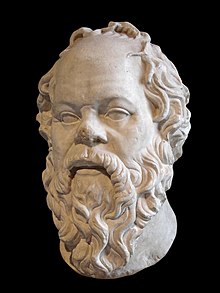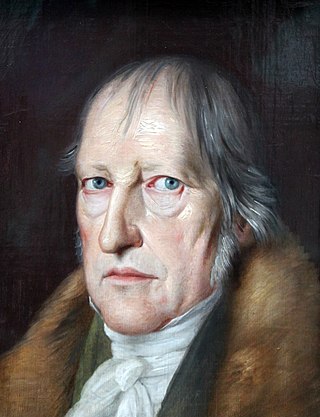
Georg Wilhelm Friedrich Hegel was a German philosopher and one of the most influential figures of German idealism and 19th-century philosophy. His influence extends across the entire range of contemporary philosophical topics, from metaphysical issues in epistemology and ontology, to political philosophy, the philosophy of history, philosophy of art, philosophy of religion, and the history of philosophy.
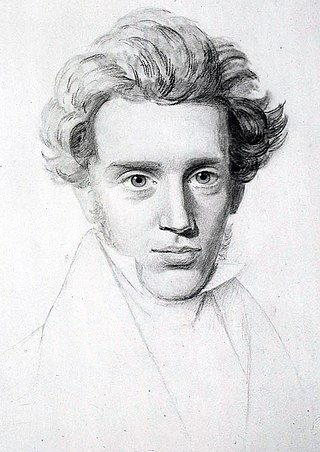
Søren Aabye Kierkegaard was a Danish theologian, philosopher, poet, social critic, and religious author who is widely considered to be the first existentialist philosopher. He wrote critical texts on organized religion, Christianity, morality, ethics, psychology, and the philosophy of religion, displaying a fondness for metaphor, irony, and parables. Much of his philosophical work deals with the issues of how one lives as a "single individual", giving priority to concrete human reality over abstract thinking and highlighting the importance of personal choice and commitment. He was against literary critics who defined idealist intellectuals and philosophers of his time, and thought that Swedenborg, Hegel, Fichte, Schelling, Schlegel, and Hans Christian Andersen were all "understood" far too quickly by "scholars."
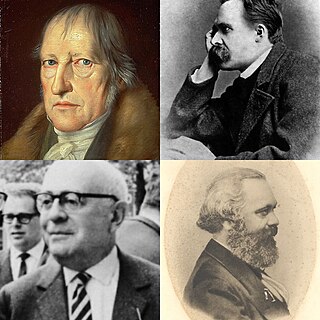
German philosophy, meaning philosophy in the German language or philosophy by German people, in its diversity, is fundamental for both the analytic and continental traditions. It covers figures such as Gottfried Wilhelm Leibniz, Immanuel Kant, Georg Wilhelm Friedrich Hegel, Karl Marx, Friedrich Nietzsche, Martin Heidegger, Ludwig Wittgenstein, the Vienna Circle, and the Frankfurt School, who now count among the most famous and studied philosophers of all time. They are central to major philosophical movements such as rationalism, German idealism, Romanticism, dialectical materialism, existentialism, phenomenology, hermeneutics, logical positivism, and critical theory. The Danish philosopher Søren Kierkegaard is often also included in surveys of German philosophy due to his extensive engagement with German thinkers.

German Romanticism was the dominant intellectual movement of German-speaking countries in the late 18th and early 19th centuries, influencing philosophy, aesthetics, literature, and criticism. Compared to English Romanticism, the German variety developed relatively early, and, in the opening years, coincided with Weimar Classicism (1772–1805).

Friedrich Wilhelm Joseph Schelling, later von Schelling, was a German philosopher. Standard histories of philosophy make him the midpoint in the development of German idealism, situating him between Johann Gottlieb Fichte, his mentor in his early years, and Georg Wilhelm Friedrich Hegel, his one-time university roommate, early friend, and later rival. Interpreting Schelling's philosophy is regarded as difficult because of its evolving nature.
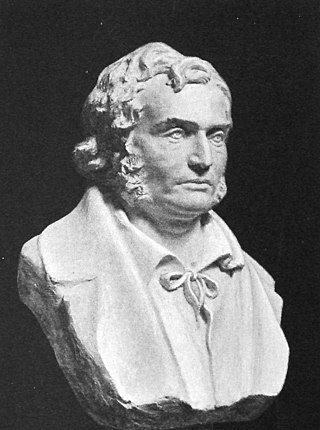
Poul Martin Møller was a Danish academic, writer, and poet. During his lifetime, he gained renown in Denmark for his poetry. After his death, his posthumously published fiction and philosophical writings were well received. He also devoted several decades of study to classical languages and literature. While serving as a professor at the University of Copenhagen, he was a mentor to the philosopher Søren Kierkegaard.

Richard McKay Rorty was an American philosopher. Educated at the University of Chicago and Yale University, he had strong interests and training in both the history of philosophy and in contemporary analytic philosophy. Rorty's academic career included appointments as the Stuart Professor of Philosophy at Princeton University, Kenan Professor of Humanities at the University of Virginia, and Professor of Comparative literature at Stanford University. Among his most influential books are Philosophy and the Mirror of Nature (1979), Consequences of Pragmatism (1982), and Contingency, Irony, and Solidarity (1989).

In historical scholarship, the Socratic problem concerns attempts at reconstructing a historical and philosophical image of Socrates based on the variable, and sometimes contradictory, nature of the existing sources on his life. Scholars rely upon extant sources, such as those of contemporaries like Aristophanes or disciples of Socrates like Plato and Xenophon, for knowing anything about Socrates. However, these sources contain contradictory details of his life, words, and beliefs when taken together. This complicates the attempts at reconstructing the beliefs and philosophical views held by the historical Socrates. It has become apparent to scholarship that this problem is seemingly impossible to clarify and thus perhaps now classified as unsolvable. Early proposed solutions to the matter still pose significant problems today.

Walter Arnold Kaufmann was a German-American philosopher, translator, and poet. A prolific author, he wrote extensively on a broad range of subjects, such as authenticity and death, moral philosophy and existentialism, theism and atheism, Christianity and Judaism, as well as philosophy and literature. He served more than 30 years as a professor at Princeton University.

Anatomy of Criticism: Four Essays is a book by Canadian literary critic and theorist Northrop Frye that attempts to formulate an overall view of the scope, theory, principles, and techniques of literary criticism derived exclusively from literature. Frye consciously omits all specific and practical criticism, instead offering classically inspired theories of modes, symbols, myths and genres, in what he termed "an interconnected group of suggestions." The literary approach proposed by Frye in Anatomy was highly influential in the decades before deconstructivist criticism and other expressions of postmodernism came to prominence in American academia circa 1980s.
Antiphrasis is the rhetorical device of saying the opposite of what is actually meant in such a way that it is obvious what the true intention is.
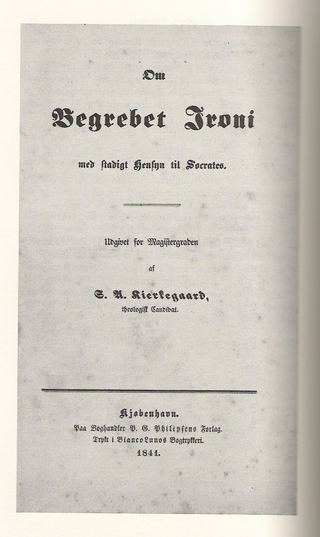
On the Concept of Irony with Continual Reference to Socrates is Søren Kierkegaard's 1841 master's thesis under Frederik Christian Sibbern. This thesis is the culmination of three years of extensive study on Socrates, as seen from the view point of Xenophon, Aristophanes, and Plato.
Irony punctuation is any form of notation proposed or used to denote irony or sarcasm in text. Written text, in English and other languages, lacks a standard way to mark irony, and several forms of punctuation have been proposed to fill the gap. The oldest is the percontation point in the form of a reversed question mark, proposed by English printer Henry Denham in the 1580s for marking rhetorical questions, which can be a form of irony. Specific irony marks have also been proposed, such as in the form of an open upward arrow, used by Marcellin Jobard in the 19th century, and in a form resembling a reversed question mark, proposed by French poet Alcanter de Brahm during the 19th century.

Contingency, Irony, and Solidarity is a 1989 book by the American philosopher Richard Rorty, based on two sets of lectures he gave at University College, London, and at Trinity College, Cambridge. In contrast to his earlier work, Philosophy and the Mirror of Nature (1979), Rorty mostly abandons attempts to explain his theories in analytical terms and instead creates an alternate conceptual schema to that of the "Platonists" he rejects. In this schema "truth" is considered unintelligible and meaningless.
Ironism is a term coined by Richard Rorty, for the concept that allows rhetorical scholars to actively participate in political practices. It is described as a modernist literary intellectual's project of fashioning the best possible self through continual redescription. With this concept, Rorty argues for a contingency that rejects necessity and universality in relation to the ideas of language, self, and community.
Irony is a literary or rhetorical device, in which there is an incongruity or discordance between what one says or does.
Sarcasm is the caustic use of words, often in a humorous way, to mock someone or something. Sarcasm may employ ambivalence, although it is not necessarily ironic. Most noticeable in spoken word, sarcasm is mainly distinguished by the inflection with which it is spoken or, with an undercurrent of irony, by the extreme disproportion of the comment to the situation, and is largely context-dependent.
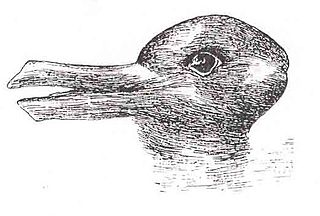
Irony's Edge: The Theory and Politics of Irony is a non-fiction book written by Linda Hutcheon on the subject of irony. Hutcheon rejects the traditional definition of irony as antiphrasis, or saying the opposite of what one means. Instead, she suggests that irony is a “...semantically complex process of relating, differentiating, and combining said and unsaid meanings - and doing so with an evaluative edge” (p. 89). She argues this process of differentiation and relation involves a rapid oscillation between two different meanings; denotation and connotation cannot be seen simultaneously but are also inextricable from each other. She likens this to the famous ambiguous image involving the rabbit/duck.

Socrates was a Greek philosopher from Athens who is credited as the founder of Western philosophy and among the first moral philosophers of the ethical tradition of thought. An enigmatic figure, Socrates authored no texts and is known mainly through the posthumous accounts of classical writers, particularly his students Plato and Xenophon. These accounts are written as dialogues, in which Socrates and his interlocutors examine a subject in the style of question and answer; they gave rise to the Socratic dialogue literary genre. Contradictory accounts of Socrates make a reconstruction of his philosophy nearly impossible, a situation known as the Socratic problem. Socrates was a polarizing figure in Athenian society. In 399 BC, he was accused of impiety and corrupting the youth. After a trial that lasted a day, he was sentenced to death. He spent his last day in prison, refusing offers to help him escape.
This is a list of articles in continental philosophy.
